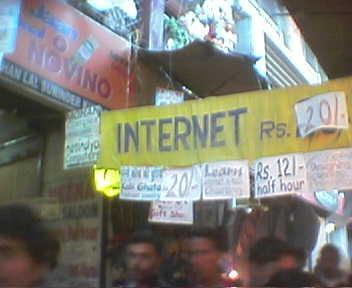Vietnam Clamps Down on "Troublesome" Cybercafes
2005.08.22
BANGKOK--The Vietnamese authorities have issued a set of regulations aimed at controlling the country's fledgling cybercafes, which are the main gateway to the Internet for most ordinary Vietnamese.
Four government ministries are involved in implementing the new directive, published by the ruling Communist Party as "State Circular No. 2 on Internet Use" on July 17, according to official media reports.
Public Security, Posts and Telecommunications, Culture and Information and Planning and Investment were all seeking to "regulate and standardize the fledgling and troublesome Internet cafes business," officials were quoted as saying by the Bangkok-based Asia Times newspaper.
Frequent Internet user and college student Le Phuong said the overall effect on economic and social development in Vietnam could be disastrous.
New rules will restrict access"According to this regulation, unaccompanied minors may no longer use the public Internet service and computers at Internet cafes," Phuong told RFA's Vietnamese service in a recent in-depth interview on Internet use among young people.
"The end result would be Vietnam, being 10 years behind the rest of the world in information technology, could be potentially skidding further down the slope of backwardness," he said.
Paris-based press freedom group Reporters Without Borders (RSF) has also criticized Circular No. 2.
"It is individual freedoms that will suffer dramatically as a result of a law like this," RSF said in a recent statement.
It would be very difficult to lift the country out of poverty and backwardness, let alone our dream to develop into a tiger or dragon in Southeast Asia.
Le Phuong, Vietnamese Internet user"These measures are a complete negation of the free enterprise principles espoused by the World Trade Organization, which Vietnam is trying to join," the group said in a statement carried on its Web site.
Phuong said the strongest opposition among ordinary Vietnamese Internet users had been to the requirements that users show identification papers at cybercafes, and leave their names and addresses on a register at the cafe.
Cybercafes to screen customers"According to Circular 2, IDs must be shown to Internet café owners....Now come additional regulations for Internet café owners to keep logs specifying customer info like full name, address, and so on," Phuong told RFA.
"I'd say reactions from different circles of public Internet service users have been very strong. They argue that this requirement is in violation of civil rights, as well as their rights to privacy," he said.
Civil rights concerns at being required to produce identification by non-police or non-military personnel were top of the list of concerns, Phuong said, especially in peace-time.
The government cites "unhealthy" tendencies among Internet users, including concerns about Internet pornorgraphy and the effects on youngsters of long hours playing computer games.
He said many Internet cafe users would be put off by the additional trouble caused by the new rules, which took effect on July 30, and businesses would soon feel the pinch.
"[The government] can't justify causing such a nuisance by verifying the IDs of all visiting users by saying it is preventing abuse of the Internet," he told RFA. "A few hundreds of customers visit Internet cafes a day. Internet café owners must hire addition staff to check and record user IDs."
Costs likely to risePhuong also predicted that the new rules would result in higher fees for online searches, affecting the accessibility of the Internet to ordinary high-school and college students, and consequently, their education.
Another widespread fear was that user databases would also provide fertile hunting grounds for on-line fraudsters, he said.
"On a societal level, the highly probable consequence is that the application of the Internet, already dozens of years behind the rest of the world, would be either abruptly interrupted forced to progress at a snail¹s pace," he added.
"It would be very difficult to lift the country out of poverty and backwardness, let alone our dream to develop into a tiger or dragon in Southeast Asia."
Last year, the Vietnam Internet Center reported that the number of Internet subscribers had jumped to more than 2 million from 823,000 in 2003. During the same period, the number of Web users at Internet cafes doubled, to 7.35 percent of the country's population of 83 million people.
Currently, an online search costs around 3,000 dong (U.S. 19 cents), but that might rise considerably if costs increased as a result of the new rules, Phuong said.
Three cyber-dissidents are currently imprisoned in Vietnam, according to RSF. They are Nguyen Khac Toan, Nguyen Vu Binh and Pham Hong Son, who is serving a five-year sentence for downloading an article entitled "What is democracy ?" from the U.S. Embassy's Web site, translating it into Vietnamese and distributing it online.
Original reporting in Vietnamese by Viet Long. Produced for the Web in English by Luisetta Mudie.
Wednesday, August 24, 2005
Subscribe to:
Post Comments (Atom)

No comments:
Post a Comment